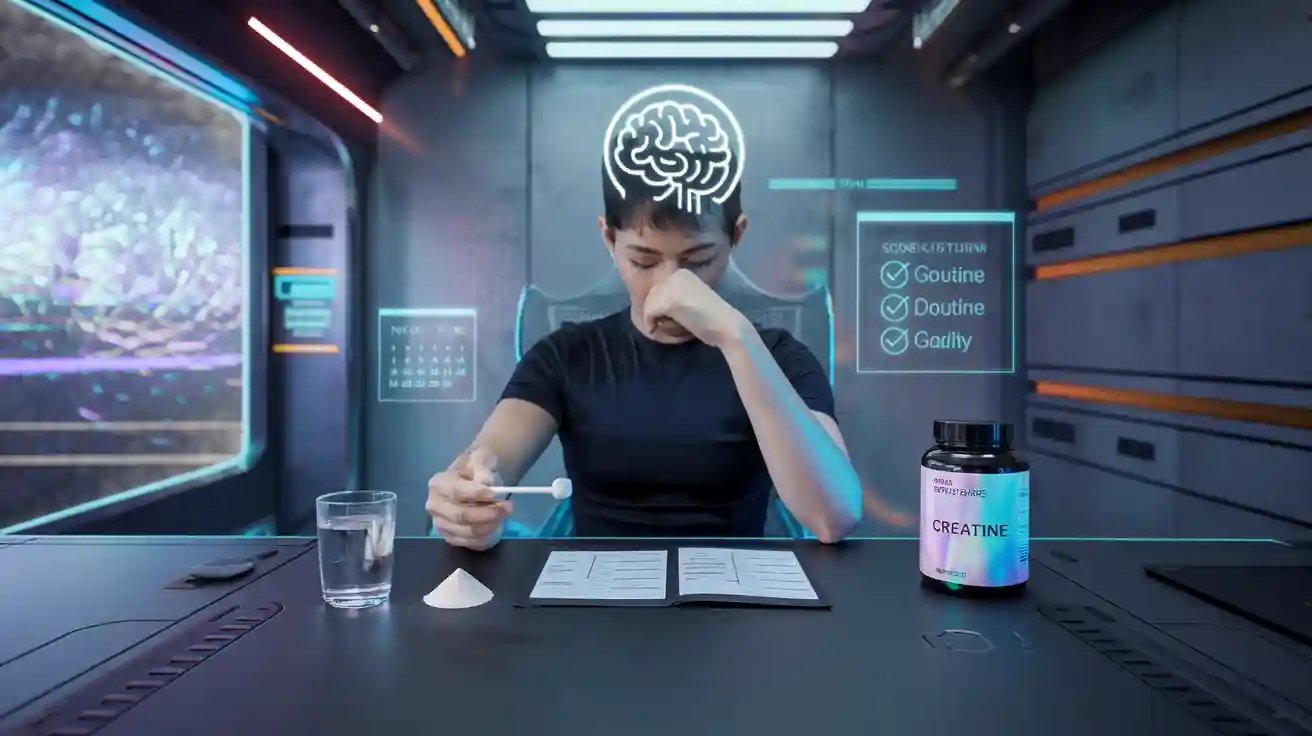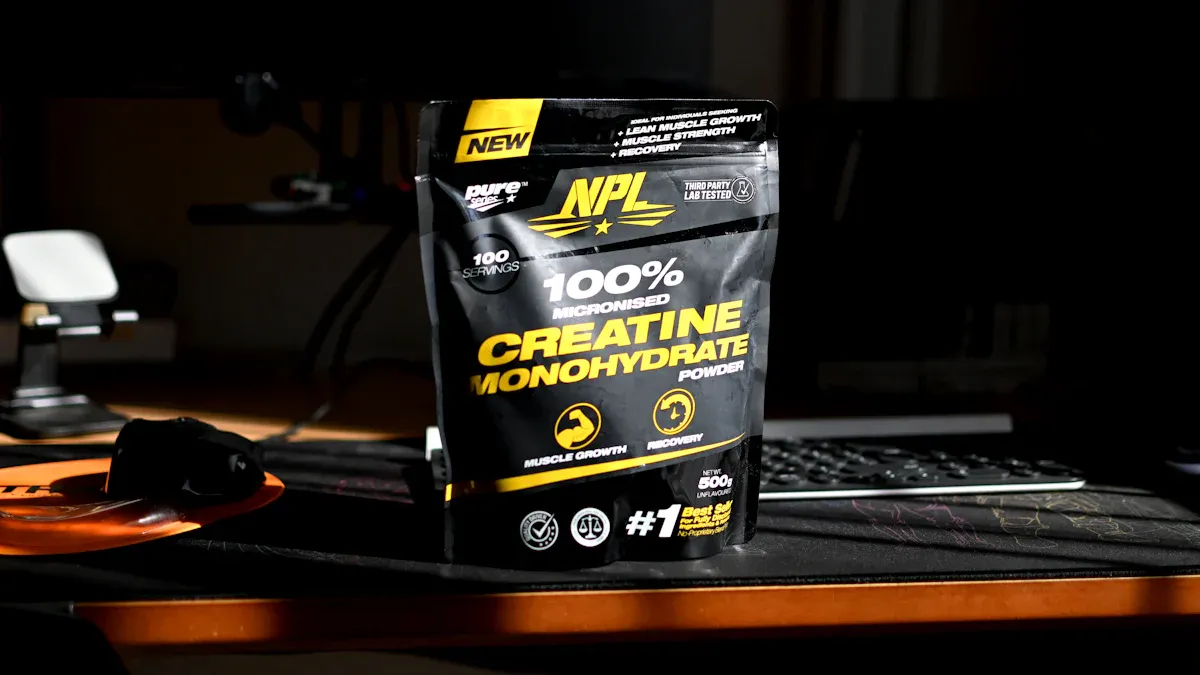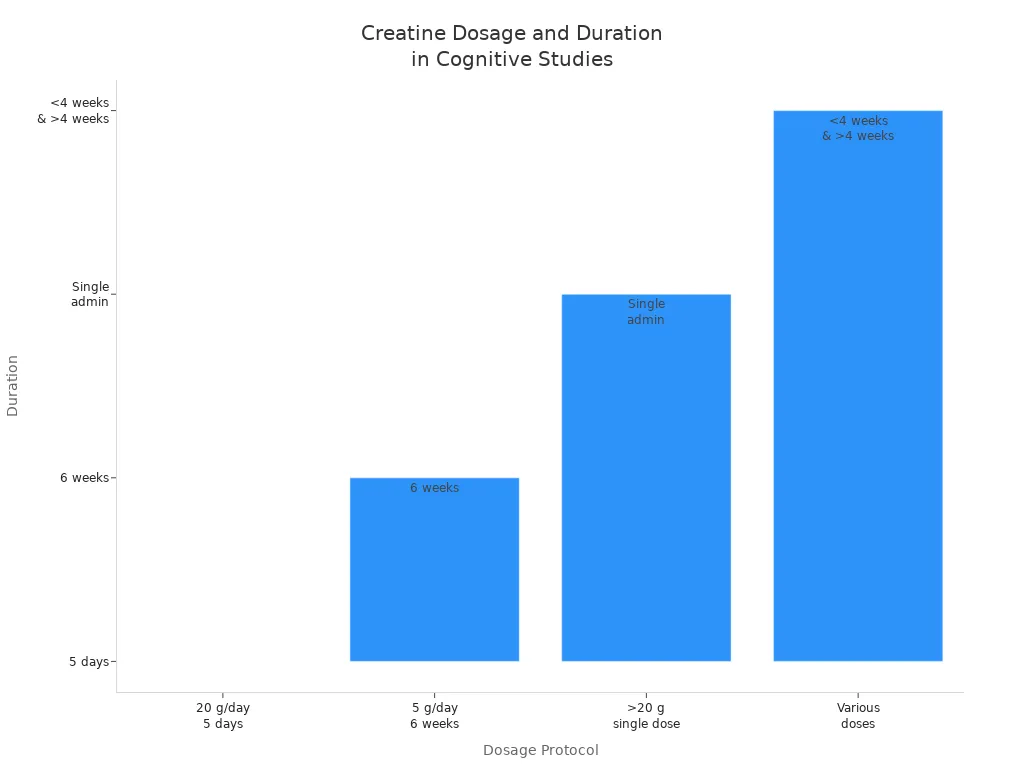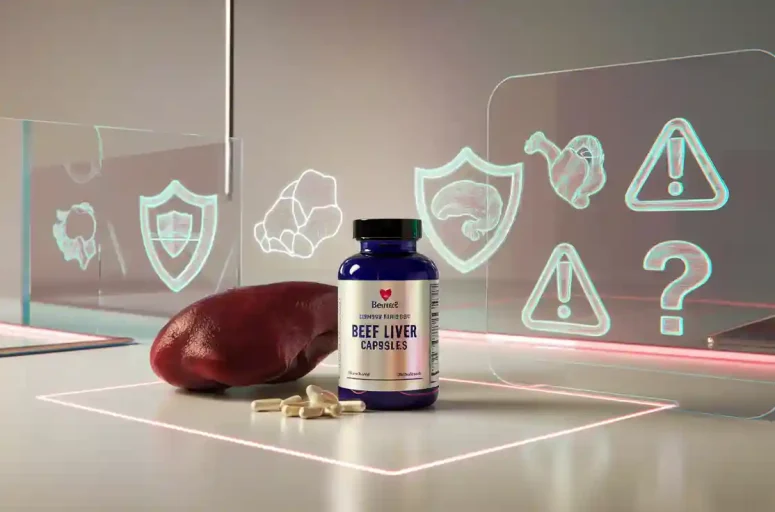
If you want to use creatine for brain fog, most research suggests a daily intake of 3 to 10 grams, with 5 grams being common for cognitive support. Studies show that creatine can help reduce mental fatigue and improve memory or focus, especially during stress or sleep loss. Many people experience brain fog, and creatine for brain fog may offer extra brain energy. Always remember, this information is not medical advice. You should talk to your healthcare provider before starting any supplement.
Key Takeaways
Taking 3 to 5 grams of creatine daily can help reduce brain fog and improve mental clarity.
Starting with a loading phase of about 20 grams per day for 5 to 7 days can speed up results but may cause mild side effects.
You can skip loading and take a steady maintenance dose; benefits may take a few weeks to appear.
Creatine supports brain energy by increasing ATP, helping you think clearly during stress or sleep loss.
Choose pure creatine monohydrate from trusted brands to ensure safety and effectiveness.
Take creatine at the same time every day and stay consistent for the best cognitive benefits.
Most people tolerate creatine well, but talk to your healthcare provider before starting, especially if you have kidney issues or take medications.
Combine creatine with healthy habits like good sleep, balanced diet, and exercise to boost brain health and reduce brain fog.
Dosage Guidelines

When you consider creatine for brain fog, you need to understand how much to take and how to take it safely. The right dosage can help you get the most benefit while reducing the risk of side effects. This section will guide you through standard dosing, weight-based recommendations, and the difference between loading and maintenance phases.
Disclaimer: The information in this section is for educational purposes only. It does not replace medical advice. Always consult your healthcare provider before starting any supplement, including creatine.
Standard Dosage
Daily Amounts
Most research on creatine and cognitive function uses daily doses between 3 and 5 grams. You can take this amount once per day, mixed with water or juice. Some studies have used up to 10 grams per day, but higher doses may increase the chance of mild side effects like stomach discomfort or water retention.
Phase | Typical Dosage | Duration | Notes/Examples |
|---|---|---|---|
5-7 days | Common in cognitive studies (e.g., Hammett et al. 2010; Alves et al. 2013) | ||
Maintenance | 3-5 g/day (0.03 g/kg) | Days to weeks | Used after loading phase; studies last from 2 days to 24 weeks |
Alternative | 2.2-20 g/day | Varies | Some studies use continuous dosing without loading (e.g., 5 g/day or 10-20 g/day for 6 weeks) |
You can see that most protocols start with a higher dose for a short period, then switch to a lower daily dose.
Weight-Based Dosing
You may want to adjust your creatine dose based on your body weight. A common guideline is 0.1 grams per kilogram of body weight per day for maintenance. For example, if you weigh 70 kg (about 154 pounds), you would take about 7 grams per day. This approach helps you personalize your intake for better results.
Loading and Maintenance
Loading Phase
Some people choose to start with a loading phase. This means you take a higher dose, usually 20 grams per day (or about 0.3 grams per kilogram), split into 4 smaller servings, for 5 to 7 days. This method fills your muscles and brain with creatine more quickly. Studies show that a loading phase can help you feel the effects sooner, especially if you want fast relief from brain fog.
Loading is not required for everyone. Your brain can still build up creatine stores with a regular daily dose, but it may take longer.
Loading can cause mild side effects, such as bloating or stomach upset, especially if you are sensitive to higher doses.
If you want to avoid these side effects, you can skip the loading phase and start with a maintenance dose.
Maintenance Phase
After the loading phase, or if you skip it, you move to a maintenance phase. You take 3 to 5 grams per day, or about 0.03 grams per kilogram of body weight. This keeps your creatine levels steady and supports ongoing cognitive benefits. Some studies suggest that even without a loading phase, taking a maintenance dose for several weeks can increase brain creatine and help with mental clarity.
Consistency is important. Take your creatine every day for the best results.
Cognitive benefits, such as improved memory and reduced mental fatigue, may take several weeks to appear.
If you experience any side effects, try lowering your dose or splitting it into smaller servings.
Tip: If you want faster results, a loading phase may help. If you prefer a gentler approach, start with a maintenance dose and be patient as your brain creatine builds up.
Safety Limits and Side Effects
Creatine is safe for most people when used as directed. Mild side effects, such as water retention or stomach discomfort, can happen, especially during the loading phase. You can reduce these effects by drinking plenty of water and spreading your dose throughout the day. Higher doses may be needed for people under high mental stress or with certain health conditions, but you should only consider this with medical supervision.
The brain absorbs creatine slowly. Either a loading phase or long-term maintenance dosing can work for brain fog.
Some people may need higher doses if they have increased cognitive demands or metabolic stress.
Always talk to your healthcare provider before increasing your dose or starting creatine for brain fog.
Creatine for Brain Fog
What Is Brain Fog
You may have heard the term brain fog, but what does it really mean? Brain fog describes a set of cognitive problems that make you feel mentally slow or cloudy. You might notice trouble focusing, forgetfulness, confusion, or difficulty following conversations. Many people with brain fog struggle to remember appointments or keep up with daily tasks. This condition often brings mental fatigue and reduced mental acuity, making it hard to think clearly or react quickly.
Brain fog can affect anyone, but it is especially common after illnesses like COVID-19, during chronic fatigue syndrome, or after chemotherapy. You may also experience it if you have autoimmune disorders, asthma, or mental health challenges. Researchers link brain fog to changes in brain activity, inflammation, sleep problems, and even hormonal shifts. The symptoms can disrupt your work, relationships, and overall quality of life.
Note: Brain fog is not a disease, but a sign that your brain is not working at its best. If you notice ongoing symptoms, you should talk to a healthcare professional.
How Creatine Helps
Brain Mechanisms
Creatine for brain fog works by supporting your brain’s energy needs. Your brain uses a lot of energy to process thoughts, store memories, and keep you alert. When you feel brain fog, your brain may not have enough energy to function well. Creatine increases the amount of creatine in your brain, which helps produce more ATP—the main energy source for brain cells. This boost in energy can help your brain work more efficiently, especially during times of stress, illness, or lack of sleep.
Scientists have found that creatine can cross the blood-brain barrier and raise brain creatine levels. This process helps your brain cells recover from stress and may reduce the effects of inflammation or low oxygen. People with low dietary creatine, such as vegetarians, may notice even greater cognitive benefits. Studies show that creatine can improve memory, mood, and stress resilience, especially in older adults or those under mental strain.
Mental Clarity
You want to feel sharp and focused throughout your day. Creatine for brain fog may help you regain mental clarity by supporting your brain’s energy metabolism. Research shows that creatine can improve short-term memory, reasoning, and even intelligence in healthy people. The effects seem strongest when you face cognitive stress, such as sleep deprivation or illness. Some people report less mental fatigue and better concentration after taking creatine.
Creatine may help you:
Think more clearly during stressful times
Stay focused when you feel tired
Remember important details and appointments
Recover mental sharpness after illness
While creatine offers promising cognitive benefits, results can vary. Some people notice big improvements in mental clarity, while others see smaller changes. The supplement is safe for most people, but you should always use it responsibly.
Disclaimer: This information is for educational purposes only. It is not medical advice and should not replace consultation with a healthcare professional.
Research Evidence
You may wonder how strong the science is behind creatine for brain fog. Researchers have explored creatine’s effects on the brain in many studies. These studies look at how creatine supplementation can improve cognitive performance, especially when your brain faces stress or fatigue.
Key Studies
Dosages Used
Scientists have tested different creatine dosages to see how they affect brain fog and mental clarity. You can see the most common protocols in the table below:
Dosage Protocol | Duration | Cognitive Outcome Notes |
|---|---|---|
20 g/day (high-dose) | 5 days | Short-term high-dose supplementation showed significant cognitive improvements. |
Moderate dosing (e.g., 5 g/day) | Several weeks (e.g., 6 weeks) | Longer-term supplementation also improved working memory and cognitive function. |
>20 g single high dose | Single administration | Acute cognitive effects observed but with safety concerns (e.g., kidney strain). |
Various doses | <4 weeks and >4 weeks | No significant difference in cognitive benefits between short-term and long-term supplementation periods. |

You may notice that high doses, such as 20 grams per day, can quickly boost brain creatine levels. However, experts warn that single high doses may cause kidney strain. Most studies recommend moderate daily doses, like 5 grams, for safer and lasting cognitive benefits.
Cognitive Effects
You can find several studies showing how creatine helps with brain fog and cognitive performance. Here are some key findings:
A clinical trial with long COVID patients used 4 grams of creatine daily for six months. Participants reported less brain fog and better concentration.
Research on Alzheimer’s patients showed that 20 grams per day for eight weeks increased brain creatine by 11%. These patients had moderate improvements in working memory and executive function.
A double-blind trial on post-COVID fatigue found that creatine improved tissue creatine levels and reduced symptoms like difficulty concentrating.
Studies in healthy adults show that creatine can improve short-term memory, reasoning, and processing speed, especially during sleep deprivation or stress.
Older adults, vegetarians, and people under acute stress often report sharper focus and less brain fog with 3–5 grams per day.
Creatine acts as an energy reserve for your brain. You may notice the greatest cognitive benefits when your brain faces metabolic stress, such as illness or lack of sleep.
Limitations
You should know that research on creatine for brain fog still has gaps. Many studies use small groups or lack control groups. Some use outdated cognitive tests, making results hard to compare. Scientists have not yet agreed on the best supplementation regimen for cognitive function. Benefits seem stronger in stressed populations, while healthy people may see only small changes.
Note: Researchers call for larger studies with standardized testing. They also want to measure brain creatine directly to better understand its effects.
There is not enough evidence to show creatine prevents cognitive decline or brain aging.
The link between dietary creatine and brain health remains unclear.
Scientists need to study how creatine works with other interventions, such as exercise, to support brain health.
Disclaimer: The information in this article is for educational purposes only. It does not replace medical advice. Always consult your healthcare professional before starting any supplement.
Daily Intake Tips
Timing
You want to get the most out of your creatine supplement. Timing can help you build a routine and support your goals. Most people take creatine at the same time each day. You can mix it with water, juice, or a smoothie. Some choose to take it in the morning, while others prefer after a meal. There is no strong evidence that one time of day works better than another for brain health. The key is to pick a time that fits your schedule so you remember to take it every day.
Tip: Mix your creatine with a drink you enjoy. This makes it easier to remember and helps you stay hydrated.
Supplement Choice
Choosing the right creatine supplement matters for your health and results. Not all products are the same. You should look for quality and safety when you shop.
Purity
Check the label for pure creatine monohydrate. This form has the most research behind it. Avoid products with extra fillers, artificial colors, or unknown ingredients. Pure creatine dissolves well and has a mild taste. If you see a third-party testing seal, that means the product meets safety standards.
What to Look For | Why It Matters |
|---|---|
Pure creatine monohydrate | Backed by most research |
No fillers or additives | Reduces risk of side effects |
Third-party tested | Ensures quality and safety |
Trusted Brands
You want a supplement from a company you trust. Look for brands with good reviews and clear ingredient lists. Many well-known brands offer creatine that meets high standards. You can check for certifications or ask your healthcare provider for recommendations.
Note: Buying from a trusted source lowers your risk of getting a low-quality product.
Consistency
Taking creatine every day helps you reach and keep the right levels in your body. Clinical studies often use daily dosing, such as 5 grams per day for several weeks, to test cognitive effects. These studies show that daily intake is part of the protocol, but they do not focus on consistency as a separate factor. Still, missing doses may slow your progress or reduce benefits.
You can set a reminder or add creatine to your daily routine. Some people link it to another habit, like brushing their teeth or eating breakfast. This makes it easier to remember and helps you stay on track.
Take your supplement at the same time each day.
Use a pill organizer or set an alarm if you forget.
Track your intake in a journal or app.
Disclaimer: The information in this article is for educational purposes only. It is not medical advice and should not replace consultation with a healthcare professional.
Combat Brain Fog Safely
When you want to combat brain fog, you need to think about safety first. Creatine can help your brain work better, but you should know how to use it responsibly. This section explains what you need to know about safety, possible side effects, and who should avoid creatine.
Safety
You can feel confident that creatine is one of the most studied supplements for both physical and cognitive health. The FDA classifies creatine as “generally recognized as safe” (GRAS), which means experts agree it is safe when used as intended. Clinical trials in children, teens, and adults—including those with neurological conditions—show no harmful effects on the kidneys, liver, or inflammation markers. Researchers have tested daily doses from 3 to 5 grams, and even up to 0.4 grams per kilogram in children, without finding serious problems.
Creatine does not cause kidney damage or renal dysfunction in healthy people.
You will not find scientific proof that creatine leads to dehydration, muscle cramps, or hair loss.
Studies show neurological benefits, such as better outcomes after brain injury and improved mood, especially in females.
Both short-term and long-term use appear safe for most people.
Note: Even though creatine is safe for most, you should always talk to your healthcare provider before starting any new supplement, especially if you have health concerns.
Side Effects
Most people tolerate creatine well, but some may notice mild side effects. In cognitive health studies, the most common issues are digestion problems and weight gain. The table below shows how often these side effects appear compared to a placebo:
Side Effect | Creatine Group (%) | Placebo Group (%) |
|---|---|---|
Any side effects | 17 | 4 |
Digestion problems | 6 | 2 |
Weight gain | 3 | 0 |
Other rare side effects include tiredness, thirst, weight loss, nightmares, cramps, racing thoughts, trouble concentrating, and nervousness. These effects happen more often in the creatine group than in the placebo group. However, no one in these studies stopped taking creatine because of side effects. Some people even reported feeling stronger and happier.
Tip: If you notice stomach upset or weight gain, try splitting your dose into smaller servings or taking it with food.
Who Should Avoid
You should know that creatine is not right for everyone. Some people need to avoid it or use extra caution.
Medical Conditions
If you have kidney disease or any problems with your kidneys, you must talk to your doctor before using creatine. People with kidney issues face higher risks because creatine can affect how the kidneys work. Even though healthy people do not usually have kidney problems with creatine, those with pre-existing kidney disease could see their condition get worse.
Creatine can also raise serum creatinine levels, which may confuse kidney function tests.
If you have any chronic illness or take medication for a health condition, always check with your healthcare provider first.
Drug Interactions
Certain medications may interact with creatine and increase the risk of side effects. These include:
Diuretics (water pills)
Medications that affect kidney function, such as cimetidine, entecavir, pemetrexed, probenecid, trimethoprim, and trospium
If you take any of these drugs, creatine could put extra stress on your kidneys or change how your body handles the medication. Even though no major drug interactions have been proven, you should always ask your healthcare provider before starting creatine, especially if you take prescription drugs or have any health concerns.
Disclaimer: This information is for educational purposes only. It does not replace medical advice. Always consult your healthcare professional before starting or changing any supplement, including creatine.
Success Tips
Tracking Progress
You want to know if creatine is helping your brain fog. Tracking your progress gives you clear answers. Start by writing down your symptoms before you begin supplementation. List how often you feel brain fog, how long it lasts, and how it affects your daily life. Use a simple journal or a notes app on your phone. Each week, record changes in your focus, memory, and mental clarity. You can also rate your brain fog on a scale from 1 to 10. This helps you see patterns and improvements over time.
Tip: Set a reminder to check in with yourself every week. Consistent tracking makes it easier to notice small changes in your brain function.
Lifestyle Integration
You can make creatine part of a healthy lifestyle to support your brain and reduce brain fog. Creatine works best when you combine it with other healthy habits. Here are some ways to integrate creatine into your daily routine:
Take your creatine at the same time each day, such as with breakfast or after a workout.
Choose a high-quality, third-party tested creatine monohydrate supplement for safety and purity.
Drink plenty of water to help your body absorb creatine and reduce the risk of stomach upset.
Eat a balanced diet with enough protein, fruits, and vegetables to support overall brain health.
Get regular sleep and manage stress, since both can make brain fog worse.
Stay active with daily exercise, which boosts blood flow to the brain and supports mental clarity.
Creatine crosses the blood-brain barrier and increases energy in your brain cells. This helps you think clearly, especially during stress or lack of sleep. It also protects your brain from oxidative stress and supports healthy brain cell function. You may notice better memory, quicker thinking, and less mental fatigue when you use creatine as part of a healthy lifestyle.
Note: Always choose GMP-certified supplements and adjust your dose based on your needs. Talk to your healthcare provider if you have questions about the best way to use creatine for brain fog.
When to Seek Help
You should know when to ask for help. If your brain fog does not improve after several weeks of creatine supplementation, or if your symptoms get worse, reach out to a healthcare professional. Seek help if you notice new symptoms, such as severe confusion, memory loss, or trouble speaking. These could be signs of a more serious brain condition. Your doctor can help you find the cause of your brain fog and suggest other treatments if needed.
Disclaimer: The information in this article is for educational purposes only. It is not medical advice and should not replace consultation with a healthcare professional.
You can support your brain health by taking 3–5 grams of creatine monohydrate daily. Consistency matters most for reducing brain fog and improving mental clarity. Choose a trusted supplement, monitor your response, and talk to your healthcare provider before starting or changing your regimen. For best results, combine creatine with healthy habits like exercise and balanced nutrition.
Disclaimer: This information is for educational purposes only. It is not medical advice and should not replace consultation with a healthcare professional.
FAQ
How long does it take for creatine to help with brain fog?
You may notice benefits in a few days if you use a loading phase. If you start with a maintenance dose, it can take two to four weeks for your brain to build up creatine levels.
Can you take creatine with other supplements?
Yes, you can take creatine with most vitamins and minerals. Always check with your healthcare provider before combining supplements, especially if you use prescription medications.
Is creatine safe for teenagers with brain fog?
Research shows creatine is safe for healthy teens when used as directed. You should talk to a doctor before starting any supplement, especially if you have health conditions or take medication.
Should you cycle creatine or take it every day?
You do not need to cycle creatine. Daily use is safe and helps keep your brain creatine levels steady. Consistency gives you the best results for mental clarity.
What is the best time of day to take creatine for brain fog?
You can take creatine at any time that fits your routine. Morning, afternoon, or evening all work. The most important thing is to take it at the same time each day.
Does creatine cause dehydration or kidney problems?
Studies show creatine does not cause dehydration or kidney damage in healthy people. Drink enough water each day. If you have kidney issues, ask your doctor before using creatine.
Can vegetarians or vegans benefit more from creatine?
Yes, vegetarians and vegans often have lower natural creatine levels. You may see greater improvements in memory and focus when you supplement with creatine.
Disclaimer: This FAQ provides general information for educational purposes only. It is not medical advice. Always consult your healthcare professional before starting or changing any supplement, including creatine.


